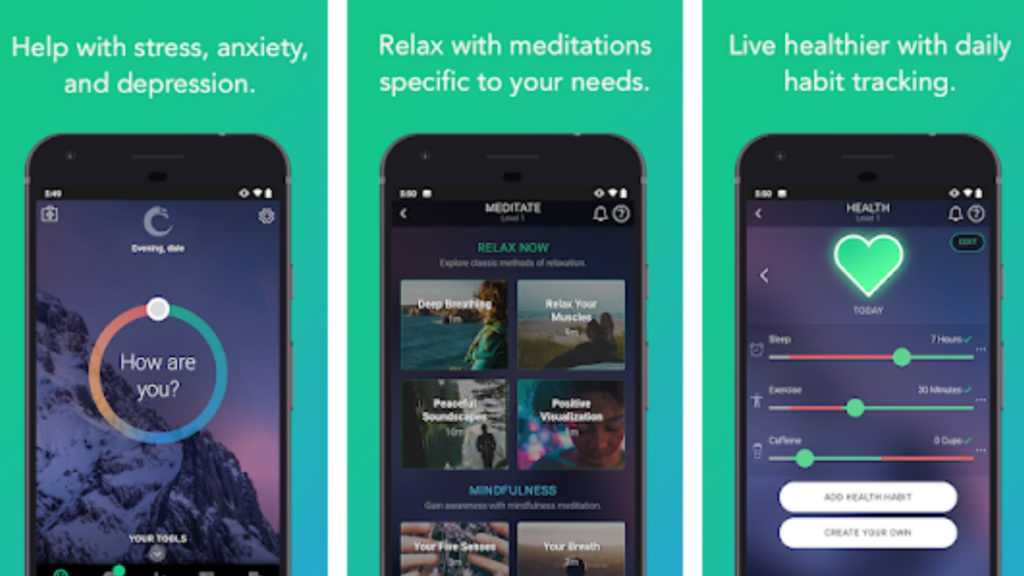With youth unemployment above 60 percent, South Africa is betting on digital skills to drive inclusive growth. Here is how MICT SETA is positioning the next generation for the Fourth Industrial Revolution.
We review Pacifica, a meditation app that’s worth your breath

Let’s face it, all of us have to deal with stress and anxiety at some point. For some, it’s a serious mental health constant, while for others it can be a moment where the modern world just gets a bit too much.
Medicine is not always the best option to treat these feelings, that’s why I decided to try one 21st century solution — a meditation app.
Meditation apps have been around for a while, and there are a boatload. After downloading a few here and there and not really being satisfied with the first five minutes of use, I finally settled on one called Pacifica.
Pacifica is mindfulness tool that claims to use real psychological methods to help users achieve calm on a daily basis.
What initially attracted me to the app was not its science, but its aesthetics. Personally, I found the turquoise tones calming, positive and inviting.
The real hook was the subtle animations in the app. Words fade on and off the screen while background images move at a languid pace, almost as if it’s breathing itself. Naturally, your breathing eases in response.
Of course, meditation is all about those breathing exercises, and after answering a few simple questions, that’s exactly what Pacifica invites you to do.
Meditations on Pacifica
Pacifica suggests the best meditation for you after you indicate your mood on a circular slider. The options range from “great” to “awful” and you can also add specific emotions you’re feeling from a list of options.
Once you tell the app how you’re feeling, it will give you a relevant meditation exercise to enjoy such as “relax you muscles” or “deep breathing”.
Before you begin the breathing exercise, you’re welcome to choose your “soundscape” — the background noise to the guided meditation.
Meditations are guided by friendly voices, speaking in calm, soft tones. One of the most notable things about this is that none of the voices are condescending — something I was apprehensive about.
When the guided meditation is over, you can continue listening to your soundscape or exit the exercise entirely.
Guided Paths
The app also features “Guided Paths”, which it describes as “audio lessons and activities created by psychologists to help you manage stress, anxiety, or depression”.
You can listen or read the lessons, which start of explaining the importance of understanding emotions, goals and health. The lessons conversational tones make it easy to absorb.
Each lesson also comes with an activity to complete. These range from breathing exercises to using the apps many features, which helps you get to know the app while improving your mental health.
You have to unlock each lesson of a guided path by completing the previous tasks. Some of the paths, however, require payment.
App features
Besides the circular mood indicator — which can track your mood on a weekly or monthly basis — Pacifica has a host of features that I find help you manage your mood better.
You can add “Health Habits” to your Health tracker in order to monitor the habits you believe you need to work from. In the app’s free version, you can add up to three from a list of 16, or add your own.
The habits include sleep, relationships, coffee consumption, and even cannabis usage.
When you’ve added Health Habits, you can indicate how much you practiced them for the day, gradually filling up a large heart indicator within the app. On a really good day, you’ll find a green glowing heart in your Health tracker.
Pacifica also has a “Hopes and Goals” board. Each works as a space that helps you curate inspiring quotes and picture for yourself, and track goals that you’ve set. I don’t find much use for the board, but the goal tracker is a good way to visualize and challenge yourself.
Finally, the app features a “Thought Tracker” too, where you can list experiences, what they made you think, and how they made you feel.
This is part of Pacifica’s psychological aspect grounded in cognitive behaviour therapy, meant to help you understand your own thoughts and how they may negatively impact you.
I haven’t yet explored this part of the app just yet as it’s more intimidating than calming.
Groups and Privacy
Pacifica is also a community, but one that takes privacy largely into account.
When you set up your profile, you are asked to add a nickname and choose a profile picture. Your choices are limited to landscapes and the nickname invites you remain anonymous on the app.
In the app’s Explore feed, you can find everything from meditations, quotes and even comments from other people that you can interact with. This distinctly gives one the sense of being “connected”.
Further, you can join groups based on different categories. The groups are meant to be spaces where you can talk to other like-minded people.
Final thoughts
Pacifica is a useful, mindful meditation app that leaves one with a sense of calm after use. Being able to track my mood and habits has given me a way to declutter my mind.
I have also noticed that, like the app suggests, I have begun to automatically practice deeper breathing whenever I feel the stress monsters creeping up.
Though some features within the app require a subscription to Pacifica, the app does not hold important aspects of itself back from free users.
I would definitely recommend giving the app a try if your mind is feeling a bit saturated.
Pacifica is a 36MB download available in Android, iOS and Web versions.
Feature image: screenshot, Google Play Store


